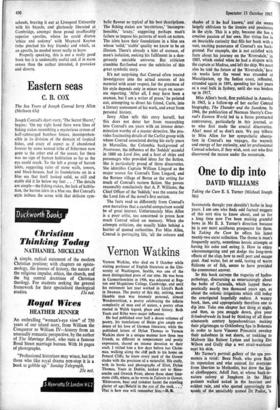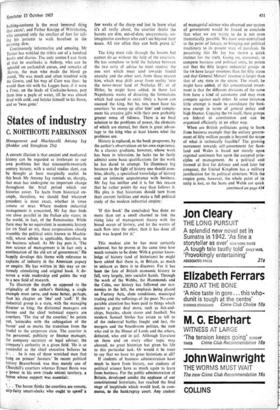One to dip into
DAVID WILLIAMS
Savonarola thought you shouldn't bathe in leap years. I am one who finds odd factual nuggets of this sort nice to know about, and so for a long time now I've been making grateful bows in Mr E. S. Turner's direction because he is our most assiduous prospector for them. In Taking the Cure he offers his latest twenty-two carat collection. The theme is man's frequently scatty, sometimes heroic attempts at having his cake and eating it. How to enjoy whoremongering and yet dodge the long-term effects of the clap, how to swill port and escape gout. And water, hot or cold, tasting of warm flatirons or of fish, seems to have provided the commonest answer.
So this book surveys the vagaries of hydro- pathology, discoursing as entertainingly about the baths of Caracalla, which lapped thera- peutically nearly two thousand years ago, as about the colonic irrigations which still today the constipated hopefully endure. A watery book, then, and appropriately therefore one to dip into. Take one chapter last thing at night, and then, as you snuggle down, give your Schadenfreude its head by thinking of all those nineteenth century hypochondriacs making their pilgrimages to Grafenberg Spa in Bohemia in order to have Vincenz Priessnitz envelop their nakedness in wet sheets, or trekking to Malvern like Bulwer Lytton and having Drs Wilson and Gully slap a wet strait-waistcoat next his skin.
Mr Turner's portrait gallery of the spa pro- moters is vivid: Beau Nash, who gave Bath its reputation and who catered for everyone from libertine to Methodist, but drew the line at clodhoppers; Adolf Just, at whose back-to- nature colony at Jungborn in the Harz patients walked naked in the heaviest and coldest rain, and who quoted approvingly the words of the unsuitably named Dr Pudor, 'a bathing-costume is the most immoral thin4 that exists'; and Father Kneipp of Worishofen, who accepted only the smallest of fees for tell- ing his patients to walk barefoot in the morning dew. Continuously informative and amusing. Mr Turner has winkled the titbits out of a hundred books and diaries. The only source I can think of that he overlooks is Aubrey, who can be splendid on outlandish curses, and remarks of Harvey, the man who made the blood go round, 'He was much and often troubled with the Gowte, and his way of Cure was thus: he would then sitt with his Legges bare, if it were a Frost, on the leads of Cockaine-house, putt them into a payle of water, till he was almosit dead with cold, and betake himself to his Stove,
and so 'twas gone.' -



































 Previous page
Previous page